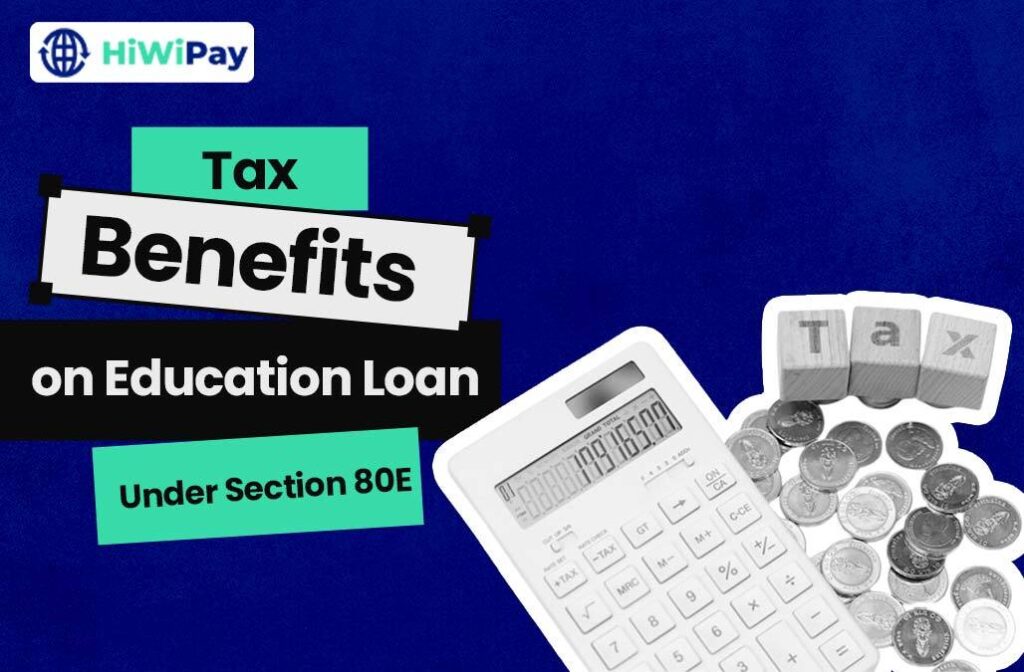What is the 80E Education Loan Deduction?
There is a tax benefit on repayment of education loans under section 80E. One thing to note here is that EMI for the loan consists of interest and a part of the principal amount.
Further, the person claiming the deduction can be the person availing of the loan for his higher education or for the purpose of higher education of his relative.
For the purpose of this section, the term ‘relative’ includes the spouse and children of that individual or the student for whom the individual is the legal guardian.

Education Loans Under Section 80E Exemption Limits
Unlike other sections of the Income Tax Act like sections 80C and 80D, this section 80E has no upper limits for the deduction.
Any amount paid by the assessee by way of interest on an education loan taken by him for higher studies can be claimed as a deduction. It should be noted that no deduction is allowed for the principal amount and only for the interest part of the loan.
The tax deduction is available for 8 years, starting from the year in which the repayment of the loan begins or until the interest is fully repaid, whichever is earlier.
Also Read : How to Transfer Money from India to Australia
Eligibility for 80E Deduction on Education Loan
To be eligible for deduction under Section 80E of the Indian Income Tax Act for interest paid on education loans, certain criteria must be met:
- Loan Purpose: The loan should have been taken solely for the purpose of pursuing higher education for oneself, spouse, or children. Higher education includes all fields of study pursued after completing senior secondary education.
- Loan Source: The loan must have been taken from any financial institution or approved charitable institution. Loans obtained from friends or relatives do not qualify for this deduction.
- Taxpayer: The deduction is available to individuals who have taken the loan for themselves, their spouse, or their children. It is not available for loans taken for siblings or relatives other than children.
- Repayment Period: The deduction is available for the interest paid during the financial year (April 1 to March 31) on the education loan. It starts from the year in which the repayment of the loan begins and continues until the interest on the loan is fully repaid or for a maximum of 8 years, whichever is earlier.
Meeting these eligibility criteria ensures that taxpayers can claim the full benefit of Section 80E, thereby reducing their taxable income and effectively lowering their tax liability.

Deductions Under Section 80E
EMI for an education loan repayment consists of an interest component and a part of the principal amount. Deduction under section 80E of the Income Tax Act is allowed only for the interest part and not for the principal amount.
Further, the deduction is allowed for:
- Maximum of 8 years, or
- Period till the interest is paid
Whichever is earlier.
For claiming a deduction for the interest on an education loan, the borrower must have a certificate from the lender wherein the interest part and the principal amount are shown separately.
Also Read : Types of Collateral for Abroad Education Loan
Period of Section 80E Deduction
Deduction under section 80E of the Income Tax Act, 1961 is structured in a manner to provide relief of tax deduction over the duration of the loan repayment. Here are the key details:
- The deduction begins in the financial year in which the repayment of the education loan starts
- The deduction is available for a maximum period of 8 consecutive years. This means taxpayers can claim the interest paid on the education loan for up to 8 years starting from the year they begin repayment.
- The deduction period ends either when the loan is fully repaid or after 8 years, whichever occurs first. If the loan is repaid within a shorter period, the deduction will end in that year.
This structured approach helps in planning finances efficiently ensuring that taxpayers can maximize the benefits from the interest deductions over the specified period.
Also Read : Education Loans with Collateral to Study Abroad
How to Calculate the Deductions for Section 80E?
Calculating the deduction amount for education loans under section 80E is very easy. Here’s how you calculate it:
- Determine the total interest paid from the loan statements.
- Exclude any principal component
- There is no upper limit. This means that you can claim a deduction for the total interest paid in the year.
For example:
Suppose you have taken an education loan and during the financial year 2023-2024, you paid the following amount:
- Interest repayment: INR 30,000
- Principal repayment: INR 50,000
For tax deduction under section 80E: The total amount paid via interest of INR 30,000 can be claimed as a deduction and total taxable income will be reduced by INR 30,000.

Documents Required
Individuals who have taken an education loan and wish to take a deduction under section 80E of the Income Tax Act must obtain a certificate from the financial institution detailing the interest paid on the education loan during the financial year.
It should be made sure that the Interest amount is specified apart from the principal amount and the total EMI amount.
Conclusion
Individuals who have taken an education loan should take benefit of section 80E of the Income Tax Act which allows deduction of interest amount paid on the loan in a financial year.
This provision not only eases the burden of educational expenses but also encourages higher learning by making it more accessible. By understanding and leveraging these benefits, taxpayers can effectively manage their finances while investing in their future or that of their dependents.
Frequently Asked Questions
What is Section 80E?
It is a section under the Income Tax Act, 1961 which allows the deduction of interest paid on education loans from the total income of the assessee.
Who can benefit from deductions under Section 80E?
Any individual who has taken a loan for higher education for himself or for his relative can claim benefits from deductions under section 80E. Relative for the purpose of this section include the spouse and children of that individual or the student for whom the individual is the legal guardian.
Which course should I opt for to avail tax benefits?
The loan can be for any field of study pursued after completing senior secondary education, including vocational courses and those pursued outside India.
From which bank should I take an education loan to avail of tax benefits?
The loan must have been taken from any financial institution or approved charitable institution. Loans obtained from friends or relatives do not qualify for this deduction.
Is there a limit on 80E deductions?
No. There’s no limit on deduction under section 80E. The deduction can be claimed for the interest amount paid without any limits.
Does a student loan reduce taxable income?
Yes. Taxable income gets reduced by the amount of deduction claimed under section 80E.
Who is eligible for student loan interest deduction?
Individuals who have taken education loans from recognised institutions including banks or any other financial institution.
How to enter student loan interest on my tax return?
While filing an income tax return, make sure to enter the amount of interest paid under column section 80E of the deductions.
References
https://incometaxindia.gov.in/_layouts/15/dit/Pages/viewer.aspx?grp=Act&cname=CMSID&cval . Accessed 19th June 2024









